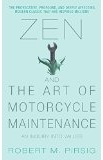Progress 1
Yesterday a friend raised the issue of progress, and I reached this quote [Quote1] when reading today. My friend who I consider too intellectual said something similar to Pirsig, and the clue is in Pirsig’s last sentence “the sole agent for this progress is reason itself”. I have accepted progress as a theme (hence Progress 1) because to do the question justice will take a while.
And the first that must be established is the benchmark, how do we judge progress? Although Pirsig does not say this in his last sentence I contend that he primarily is assessing progress using the benchmark of reason or intellect – a classical benchmark. To be crass, to measure progress we examine technological advance; simplistically this could be an intellectual benchmark. However I am not contending that such is the limit of Pirsig’s benchmark. Within the quoted paragraph he also presents a romantic benchmark of death and destruction whch he contends does not hold up.
Within Buddhism there is an approach that says a human is made up of the 5 khandas – rupa – body, vedana – feelings, sanna – perceptions, sankhara – thoughts and vinnana – consciousness. What Pirsig is discussing as romantic-classic split is vedana/sankhara. Why have I bothered with this Buddhist terminology? According to Ajaan Buddhadasa there is a theme common in all Buddhisms – “the removal of attachment to the 5 khandas”. In his discussion of progress Pirsig is suggesting measuring progress by reason (sankhara) – countering measuring progress by feelings (sanna). Yet both ways are measuring progress by an attachment whereas I suggest one needs to be detached to measure progress. A romantic must see the death and destruction as primary for a romantic would judge by compassion, whereas a classic assessment would see the importance of technology, the ability of that technology to counter climate issues and so on. Can these approaches – classic and romantic – ever be detached to evaluate progress?
Detachment is a term that is often applied to the state of mind that comes from meditation, this meditation could be producing mindfulness, and one definition of mindfulness I heard was that it was judgement-free awareness. If there were judgement-free awareness of progress, would that not be appropriate?
And in this platform I have used the word Zen to describe the state of mind that detaches from mind and body in meditation. So I am contending that the appropriate benchmark to evaluate progress is Zen mind.
In Buddhism life is often described as having three characteristics – anatta (no self), anicca (permanence) and dukkha (suffering). Perhaps the zen mind could be considered anatta leaving it to judge life’s progress in terms of permanence and suffering. This brings an obvious question:-
Do we judge progress by the level of suffering in society?
What is anicca – this permanence? That which doesn’t change. Within consideration of progress there is an element that doesn’t change, for example timeless truth. A Buddhist would automatically describe the dhamma as this timeless truth, and whilst I agree such a statement is not appropriate here because it is dogma. The zen mind needs to consider how this timelessness helps us evaluate progress as well as measuring progress in terms of suffering. In this quote Pirsig did consider suffering, is zen mind happy with his measuring? But was there any timelessness in his assessment? I suggest not because the measure was intellect.
How important is to see progress through the zen mind and these three characteristics? Progress is confusing, and needs to be examined further.





